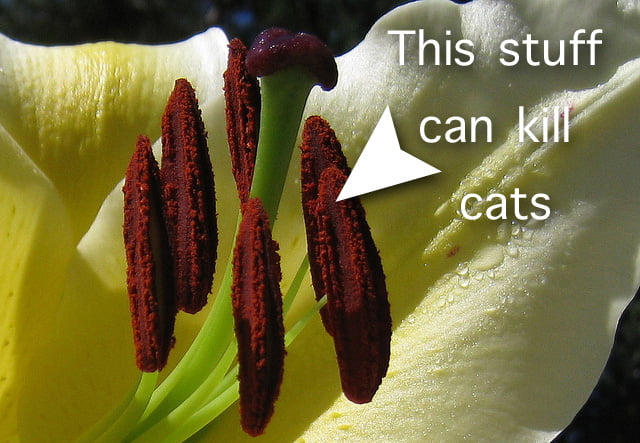People ask: Which lilies are not poisonous to cats? After you have read this article you’re going to decide that it is unsafe to buy any form of lily for your home if you live with a cat companion. Let me explain. There are lilies which are not poisonous to cats but they are not true lilies. As I understand it (but double check please), it is only true lilies, which are plants of the genus Lilium which are poisonous to domestic cats.
This begs the question as to which actual plants of the lily family are poisonous to cats. A study tells us that three Lilium species have been documented to cause toxicosis in cats (illness through poisoning): Easter lilies, Tiger lilies and Asiatic hybrid lilies. Easter lilies are particularly popular during Easter holidays which are coming up at the time of dictating this article.
However, you cannot assume that other lilies within this genus are non-toxic to cats. That should not be assumed under any account. Other related plant species suspected of nephrotoxicity (kidney poisoning) are listed by the National Animal Poison Control Center (an American institution). They include: Day lily, Early Day lily, Orange Day lily, Red lily, Rubrum lily, Stargazer lily, Western lily and Wood lily.
However, if one looks up the full list of plants within the genus Lilium in Wikipedia you will find that there are 90 species of lily. The most popular hybrids are Asiatic, Aurelian and Oriental lilies.
As stated at the beginning, “cats are very sensitive to poisoning by plants of the genus Lilium“. These are considered to be true lilies and therefore all these plants referred to on this page must be considered to be poisonous to cats and cats should not go anywhere near them because they can be fatal to the domestic cat.
It should be added that many other plants have “lily” in their common name but they are not true lilies. The problem as I see it is that because they are described as lilies even though they are not they will look similar to true lilies and therefore unless you have excellent knowledge of plants and particularly this species of plant you have to steer well clear of all plants with the word “lily” in them whether they are true lilies or not.
For the record, and for completeness, it was found in the study that the “aqueous extracts of leaves and flowers [of plants of the genus Lilium] were nephrotoxic and pancreotoxic. This means that they were toxic to both the kidney and to the pancreas. They cause significant kidney changes including acute necrosis of proximal convoluted tubules and the generation of pancreatic acinar cells. In short, these plants damage both the kidneys and the pancreas and are fatal in 50-100% of cases where there is no treatment.
Cats Protection, a major cat charity in the UK, have just issued a warning about the dangers of these plants. This is because Mother’s Day and Easter are both ahead of us. It is commonplace to purchase lilies during these times as gifts. Lilies can also be given as gifts on Valentine’s Day and one lady, Sonia Barnett, was horrified to find that a gift to her of lilies poisoned and killed three of her beloved cats very quickly. Please beware.
Study referred to: A comprehensive study of Easter lily poisoning in cats.



I feed feral cats, the kittens hide under the tiger Lillie’s should I remove the Lillie’s ?
If it says “lily” I don’t buy it and if I receive a lily of any kind in a bouquet or as a single plant, It is immediately destroyed, as is the entire bouquet. I have seen many cats who have eaten or chewed on the plants and we have NEVER been able to save any. One cat came in 10 minutes after just walking on the leaves that Mom had trimmed, and ed lost him also.